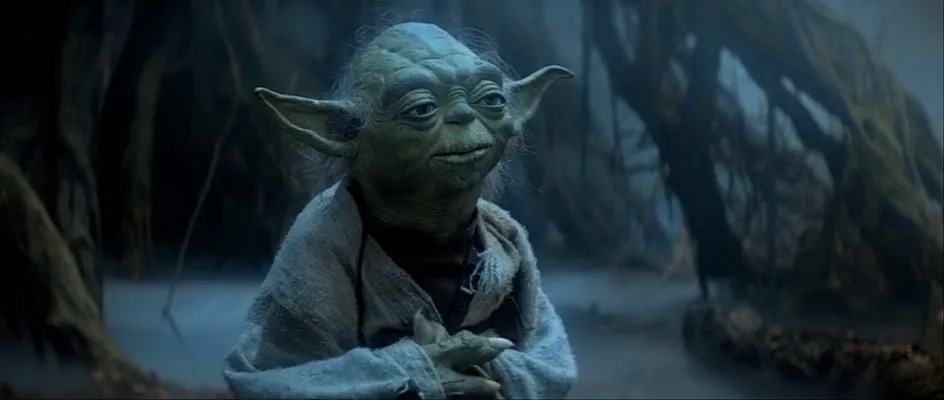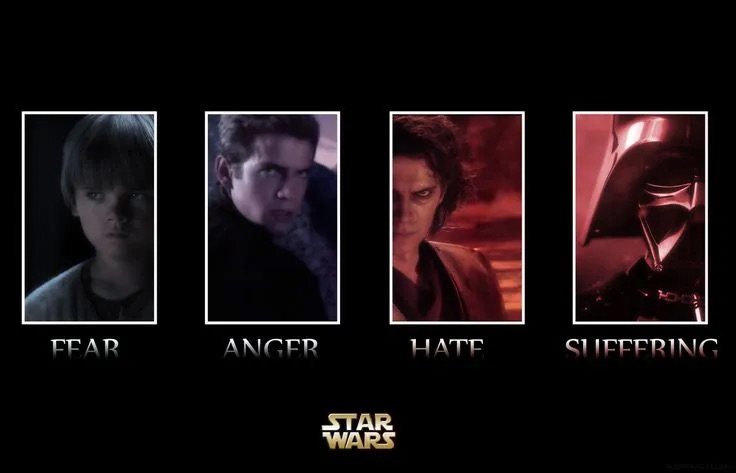
The Star Wars prequels were among the least-enjoyed by myself and several of my ancient Gen-X friends, while my Gen-Z nephews love them. But, for me, there is this fantastic Zen observation in Episode I which few people notice or think about much.
It's where Yoda discusses fear and attachment in Episode I. In the scene Yoda asks Anakin how he feels, and he observes Anakin’s fears about losing his mother. Anakin asks what fear has to do with anything — to which Yoda answers:
“Everything! Fear is the path to the dark side. Fear leads to anger. Anger leads to hate. Hate leads to suffering.”
Yoda’s buddhist speech offers a very real insights I have found to be true in life. About how we experience attachment and loss, and how we fear losing people or things important to us. We all know (or should know) that constantly fearing loss is not good for your mental health. And while you may not turn into Darth Vader, constant fear of loss just no way to live. And people tend to get angry and hateful if they're fearful long enough. It all starts with fear: fear of loss, fear of "the other". Fear is just fear, and it can be acknowledged and dealt with—but once it's anger and hate you've got a special form of suffering. It's weight. It's a dark way to experience life, a "darker side" of things if you will (yeah, yeah...).
So, yes, it's probably obvious to you that fear of loss makes you anxious and, eventually, angry. But indulge me here, brave Star Wars fan.
In my teen years and beyond, I struggled internally with my mother’s decisions and the evolving state of her health. So I would try to get my mom to stop smoking or eat better, because I feared she would get cancer or die early like my father did in his 40s. So I tried many, many, times to help Mom just transform into this healthy person that she “should be”.
And of course I never got my mother to stop smoking. I wanted to control something that scared me (losing my mom to lung cancer), but I eventually realized that my need to control things—and being attached to this fear of possible loss—was a direct path to frustration, and even anger...all those things Yoda goes on about. It’s an important distinction many people fail to make: You are not in control of the universe. Some folks don't really accept how little control we truly have. But once Ego lets go of that old illusion of control, and think a little bit, you can actually adjust how you experience life.
Once I stopped trying to control my mom’s smoking, stopped trying to change her, I began to accept her for who she is without reservation or judgment. And who is she? My mom is this cool person who is hilarious, happy, and doesn’t worry about things. I enjoy that she laughs about everything and is this glass-half-full lady who (despite her own losses in her life) is all about living life in the moment. She’s loud (sometimes maybe too loud), talks a lot, and wants you to know about a good movie on TCM. She lives simply, and she has a simple and effective life-philosophy that I understood and respected once I actually took the time to really listen...and look. I changed how I experience my mom with this new lens, once I stopped only focusing on her smoking.
Does it mean I must love the smoking stuff? No, of course not. But only when I started enjoying my mother’s presence, instead of worrying about losing her to smoking and trying to control this part of my her life...all because I didn't want to lose my mom to lung cancer or something... only when I stopped did I realize all of these other great things about my mother. Things that matter. And you know what? Flash-forward 20+ years and now my mother is 83 years old. I’m 40. And our relationship is pretty good. Her health is in decline with age, but rather than live in fear of loss: I enjoy the time we have. Because of this, we've had some great moments I otherwise would have missed...and memories to look back on.
I am learning that meeting people where they are, improves how I experiencing people. And some loss (somewhere) is always coming, sometime, to us all. Fear of loss and wanting total control? Doesn't fundamentally change a thing in this life. Poor Anakin / Vader won't realize that until 5 movies later, though.
Practicing this isn’t always easy. In fact it's sometimes impossible: when my friend Ben was seriously ill, there was the normal fear and anger you would expect. Fear of losing a friend, and anger at Doctors decisions led me to second-guessing every call they made as they worked to save him. The longer my friend's ordeal went on, and the less control his family had in the situation, the more angry I became (easy for me to do). In all honestly there truly was little I could bring up that hadn’t already been tried by my friend’s doctors. He tragically passed, and my anger remained.
I had some pretty cynical and hateful moments in the weeks and months after that loss. I didn’t believe what doctors said about much of anything for while. I withheld my trust and extended only extended fear and hate to anybody with MD in their title. And I realized: the longer I operate that way, the less secure and more distrustful I may be the rest of my life. I forgot that trust is an act, of you granting it. Even when granted, not necessarily earned, our past trauma doesn't let us trust well. I eventually re-learned being fearful and angry is a real drag. For you and everybody around you.
All we can do is try to not run through the door that “constant fear of loss” opens wide for us. Whether we learn it from a Zen Master or a tiny green muppet in Star Wars: fear really does lead to anger and suffering.
Correct, Yoda was.

Constant fear leads you to anger. Being a fearful angry person leads you to hate. Being hateful leads you to suffer.